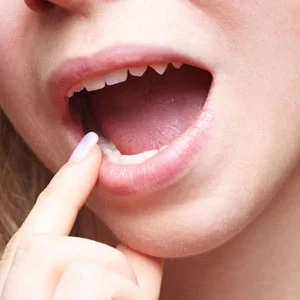
Can Gum Disease Cause a Sore Throat and Hoarseness? Exploring the Link
- 1. What Is Gum Disease?
- 2. How Gum Disease Affects Your Body Beyond the Mouth
- 3. Can Gum Disease Cause a Sore Throat and Hoarseness?
- 4. Why Does Gum Disease Affect the Throat?
- 5. How to Treat and Prevent Throat Symptoms Caused by Gum Disease
- 6. Expert Advice on Maintaining Oral Health
- 7. Learn More About Gum Disease and Treatment Options
Gum disease, also known as periodontal disease, is a common condition caused by bacterial infection in the gums. It usually starts with gum inflammation (gingivitis) and can progress to more severe forms if not treated. The symptoms include swollen, bleeding gums, bad breath, and sometimes, tooth sensitivity or loose teeth. While gum disease is primarily an oral health issue, its effects can extend to other parts of the body, including the throat.
Many people don’t realize that gum disease can influence other parts of the body. When left untreated, the bacteria from infected gums can enter the bloodstream and potentially cause inflammation in other organs, including the heart. But what’s even more surprising is how it can affect your throat and voice. This is because the oral cavity and throat are interconnected, with both involved in breathing, swallowing, and speaking.
The question arises: can gum disease cause a sore throat and hoarseness? The answer is yes, it’s possible. While gum disease itself doesn’t directly cause throat infections, the bacteria from the gums can travel to the throat, leading to irritation and inflammation. This may result in a persistent sore throat, and in some cases, hoarseness. The buildup of plaque and tartar in the mouth can also contribute to the formation of post-nasal drip, which can further irritate the throat, leading to discomfort or a scratchy voice.
For instance, a person suffering from severe gum disease may experience both gum tenderness and throat irritation simultaneously. This connection is especially noticeable in those with chronic gum infections who may unknowingly exacerbate the issue by breathing through their mouth or having constant bad breath.
Gum disease can affect the throat for several reasons:
- Infection Spread: Bacteria in the infected gums can spread to the throat through the saliva, leading to irritation and inflammation.
- Post-Nasal Drip: Gum disease can contribute to sinus issues or nasal congestion, leading to post-nasal drip. This is when mucus drips down the back of the throat, causing irritation and sore throat symptoms.
- Dry Mouth: People with gum disease often suffer from dry mouth (xerostomia), which can worsen throat irritation and cause hoarseness due to a lack of saliva.
- Increased Bacterial Load: Chronic gum disease means the mouth is constantly exposed to harmful bacteria, which can irritate the tissues of the throat, especially when these bacteria are swallowed.
These factors combine to create a perfect storm of throat irritation that can manifest as a sore throat or even persistent hoarseness. In fact, many patients seeking treatment for gum disease may also report throat-related symptoms, making the connection between oral health and throat issues all the more evident.
If you’re experiencing a sore throat or hoarseness in addition to gum disease, here are some treatment and prevention strategies:
- Proper Oral Hygiene: The first step in preventing further irritation is improving your oral care routine. Brushing twice a day, flossing regularly, and using mouthwash can help reduce the bacterial load in your mouth, minimizing the risk of throat symptoms.
- Seek Professional Dental Care: If your gum disease is severe, it’s important to visit a dentist for professional cleaning and treatment. Procedures like scaling and root planing can remove plaque and tartar buildup, which will help prevent the spread of bacteria to your throat.
- Hydrate: Dry mouth can exacerbate throat discomfort, so it’s essential to drink plenty of water throughout the day. Saliva is crucial for keeping your throat moist and preventing irritation.
- Consider a Mouthguard: If you suffer from mouth breathing or snoring due to gum disease, using a mouthguard or nasal strips can help alleviate the strain on your throat.
In some cases, a doctor may recommend over-the-counter throat lozenges or gargles to soothe irritation. However, treating the underlying gum disease will ultimately be the most effective way to alleviate throat-related symptoms.
Dental experts recommend that anyone experiencing symptoms of gum disease, especially alongside throat issues like a sore throat or hoarseness, should seek prompt treatment. Left untreated, gum disease can progress to more severe stages, leading to tooth loss and potential systemic health problems.
According to Dr. Jane Williams, a leading periodontist, “If you’re dealing with gum disease and notice any symptoms beyond the mouth, such as throat irritation or voice changes, it’s crucial to get professional dental care as soon as possible. Early intervention can help prevent further complications.”
If you’re experiencing throat symptoms and suspect gum disease might be to blame, don’t wait. Learn more about how you can improve your oral health and prevent further issues by visiting Dentistry Toothtruth. Here, you can find expert advice, product recommendations, and information on gum disease treatments to help you regain your health and restore your smile.







 Dillon Family Dentistry5.0 (114 review)
Dillon Family Dentistry5.0 (114 review) Lane & Associates Family Dentistry - Cary Tryon4.0 (560 review)
Lane & Associates Family Dentistry - Cary Tryon4.0 (560 review) Summer Smile Dental South Gate4.0 (461 review)
Summer Smile Dental South Gate4.0 (461 review) Southcoast Endodontics5.0 (4 review)
Southcoast Endodontics5.0 (4 review) First Class Dental PA5.0 (248 review)
First Class Dental PA5.0 (248 review) Smile For Life Dental5.0 (707 review)
Smile For Life Dental5.0 (707 review) The Importance of Oral Health Education During Pregnancy for a Healthy Pregnancy
The Importance of Oral Health Education During Pregnancy for a Healthy Pregnancy Best Tips for Brushing Your Teeth Properly for Healthy Gums: Essential Techniques for Oral Health
Best Tips for Brushing Your Teeth Properly for Healthy Gums: Essential Techniques for Oral Health Why Skipping Dental Checkups Can Lead to Bigger Oral Health Problems
Why Skipping Dental Checkups Can Lead to Bigger Oral Health Problems Advantages of Porcelain Dental Restorations
Advantages of Porcelain Dental Restorations How Can Diabetes Cause Tooth and Gum Problems? Preventing and Managing Oral Health Issues
How Can Diabetes Cause Tooth and Gum Problems? Preventing and Managing Oral Health Issues Healthy Habits for Promoting Good Oral Health and Hygiene: Tips for a Healthy Smile
Healthy Habits for Promoting Good Oral Health and Hygiene: Tips for a Healthy Smile